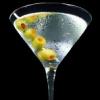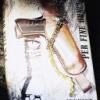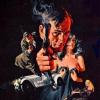Fleming only mentions Vittel in 'Casino Royale'. But Bond's water of choice is Perrier:
'For the soda he always stipulated Perrier, for in his opinion expensive soda water was the cheapest way to improve a poor drink.'
(FAVTAK)
Now you can't imagine Faulks could be expected to know that - FAVTAK - fact, can you! 
Well, it's odd because in fact Sebastian Faulks read From A View To A Kill rather closely. But... perhaps not closely enough. Here's the whole paragraph from Fleming's short story that Trident quoted:
'James Bond had his first drink of the evening at Fouquet's. It was not a solid drink. One cannot drink seriously in French cafés. Out of doors on a pavement in the sun is no place for vodka or whisky or gin. A
fine à l'eau is fairly serious, but it intoxicates without tasting very good. A
quart de champagne or a
champagne à l'orange is all right before luncheon, but in the evening one
quart leads to another
quart and a bottle of indifferent champagne is a bad foundation for the night. Pernod is possible, but it should be drunk in company, and anyway Bond had never liked the stuff because its liquorice taste reminded him of his childhood. No, in cafés you have to drink the least offensive of the musical comedy drinks that go with them, and Bond always had the same thing — an Americano — Bitter Campari, Cinzano, a large slice of lemon peel and soda. For the soda he always stipulated Perrier, for in his opinion expensive soda water was the cheapest way to improve a poor drink.'
In Chapter 20 of Devil May Care, we have the following:
'[Bond] contented himself with buying a suitably risqué postcard for Moneypenny and went to a small pavement café on rue des Bourdonnais to write it. He ordered an Americano - Campari, Cinzano, lemon peel and Perrier - not because he particularly liked it but because a French café was not a place in his view for a serious drink.
It was surprisingly good, the zest of the lemon cutting through the sweetness of the vermouth, and Bond felt almost fully restored as he left some coins on the zinc-topped table and stood up.'
(So, in fact, Faulks has Bond drink Vittel
and Perrier, both of which were referenced by Fleming. Bond also has whisky and Perrier sent up to his room earlier in this same chapter.)
In its review of Devil May Care (
http://online.wsj.co...=googlenews_wsj), the Wall Street Journal pointed out the difference between Fleming and Faulks using precisely these two passages: 'Mr. Faulks chops all [Fleming's] delightful froth down to joyless paraphrase.' But I think it's more than that. There's purpose to the froth, and it's what drives the tension in Fleming's story. Faulks loses a few words but also the angle, and he doesn't provide a more interesting one to take its place. Fleming states that Bond feels the Americano is a 'poor drink', damning it with the bitingly faint praise that it is the 'least offensive of the musical comedy drinks'. Faulks tones down Bond's view: now, he merely doesn't particularly like it. A man can, of course, change his mind about a drink, depending on the cards life deals him, what mood he's in at that moment or how the café serves it, and Faulks does note that Bond finds the drink 'surprisingly' good. But it's still a little odd that he does. Fouquet's would have known how to make a decent Americano - why has this anonymous café's hit the spot? Why has Bond changed his mind about a drink he was so insistently and eloquently dismissive of a few years earlier? We don't know, because Faulks has moved on.
These brief passages show a great deal about these two writers, and the importance of seemingly minor details in thrillers of this kind. Faulks, a few lines later, tells us that Bond 'had time to kill'. That's a dangerous thing to write in a thriller. Fleming's Bond often had time to kill, and his passage, and most of From A View To A Kill, in fact, demonstrates it. But Fleming doesn't tell us that Bond has time to kill; he
shows him killing it, rather spectacularly. Faulks deals quickly with the ordering of the drink, fails to give Bond any interesting reaction to it and then tells us that his main character is at a loose end. In a thriller, that's the last thing you want to be told by the writer. Fleming knew that he did not always hurry his action along fast enough. In his 1962 article How To Write A Thriller, he wrote:
'I often sin grievously in this respect. I am excited by the poetry of things and the pace of my stories sometimes suffers while I take the reader by the throat and stuff him with great gobbets of what I consider should interest him.'
Fleming was interested in creating the exciting, memorable elements of spy thrillers – the fantastic villain, the extraordinary conspiracy, the beautiful girl; stringing them into a coherent and continually suspenseful story was less important to him. In How To Write A Thriller, Fleming discusses his use of brands at some length. He says he has two methods of making readers swallow his fantastic plots:
'First, the speed of narrative, which hustles the reader quickly beyond each danger point of mockery and, secondly the constant use of familiar household names and objects which reassure him that he and the writer have still got their feet on the ground. Real names of things come in useful: a Ronson lighter, a 4½ litre Bentley with an Amherst-Villiers super-charger (please note the solid exactitude), the Ritz Hotel in London. All are points to comfort and reassure the reader on his journey into fantastic adventure.'
Fleming has often been credited with introducing the brand into the thriller, but the device had been used before - and to strikingly similar effect. In The Scarlet Impostor by Dennis Wheatley, a best-seller published in 1940, British secret agent Gregory Sallust visits Paris on a mission:
'Whenever he stayed in the French capital he put up at the St Regis, in the
Rue Jean Goujon, just off the
Champs Elysées. It was a quiet hotel and Gregory preferred it to the larger places, although it was quite as expensive, because each of the rooms was furnished with individual pieces. Many of them were valuable antiques, giving the place the atmosphere of a beautifully furnished private house rather than of an hotel, and Gregory liked luxury and comfort whenever he could get it.'
Moments of great luxury and comfort have been mainstays in the lives of fictional secret agents since the birth of the thriller in the early 20th century, but Wheatley had to work much harder to make his often highly implausible plot developments convince; he did this with breakneck pacing supported by a carefully cultivated insider's tone. He was one of the first thriller-writers to give brands their real names; publishers generally saw the practice as free advertising and required authors to invent names. So E Phillips Oppenheim's novels featured the Milan Hotel, modelled on the Savoy, and Valentine Williams' characters smoked Melania cigarettes, a non-existent brand that could only be bought at London’s equally non-existent Dionysus Club. In Sax Rohmer's novels, real-life political figures were also disguised, so Hitler became 'Rudolph Adlon' and Mussolini 'Monaghani'. An exception seems to have been cars. Although Leslie Charteris' Saint drove non-existent Furillacs and Hirondels, and Dornford Yates' characters usually favoured the similarly fictional Lowland, many other thriller characters drove Rolls Royces, Daimlers, Mercedes-Benzes and Bentleys.
But Wheatley took the use of brand names to a whole new level. In The Scarlet Impostor alone, Sallust drinks two Bacardis and pineapple juice (his favourite cocktail), some pre-1914 Mentzendorff Kümmel, a Vermouth Cassis and a few swigs of unspecified brandy. We learn that his gun is a Mauser automatic and his tailor West's of Savile Row. He escapes from pursuing Nazis on a twin-cylinder BMW motorbike and tells a beautiful German aristocrat he hopes to dine with her in the Ritz after the war. And he smokes Sullivans' Turkish mixture cigarettes, which he keeps in a 'plain engine-turned gold case with no monogram or initials'. With the case, the unbranded becomes the ultimate brand, the anonymity telling us this is a man who can appreciate a simple and well-crafted object, regardless of whether or not it has a name. But note that it is still gold and, the crucial telling detail, 'engine-turned' - that's solid exactitude. And, of course, the simplicity of the case gives credence to the special Turkish mixture cigarettes it contains: they weren't picked for the cachet, but for the same love of good quality. It's pure coincidence that they're that exclusive.
After checking into the St Regis in Paris, Sallust's mission soon requires him to woo a young Frenchwoman called Collette. He's not sure where to take her out to dinner. After considering and rejecting the Tour d'Argent, the Café de Paris and Pocardi's for various reasons, he remembers the Vert Galant, 'down by the river on the right bank':
'Quiet and unostentatious, it was yet one of the oldest-established restaurants in Paris, and the cooking there was excellent.'
Collette approves of his choice: 'Real French cooking - not the sort of messed-up things they make for you English and the Americans in the smart places - so I have been told. I have never been there and I'd love to go, but I'm afraid you will find it very expensive.'
Wheatley is hammering home the idea that his agent is not just wealthy (though he takes care to less us know he is that), but has a connoisseur's tastes - and in 1940 as now, knowing the place beloved by the locals is the ultimate insider one-upmanship.
In From A View To A Kill, published two decades later, Fleming upped the ante on this device even further. Bond doesn’t stay in a lesser known but nevertheless expensive hotel like St Regis: he stays in the Terminus Nord, 'because he liked station hotels and because this was the least pretentious and anonymous of them'. And, as in Wheatley, the restaurants Bond chooses to dine in are never the obvious ones:
'For dinner, Bond went to one of the great restaurants — Véfour, the Caneton, Lucas-Carton or the Cochon d'Or. These he considered, whatever Michelin might say about the Tour d'Argent, Maxims and the like, to have somehow avoided the tarnish of the expense account and the dollar.'
Such passages constitute Fleming's 'points to comfort and reassure the reader on his journey into fantastic adventure'. But here we see that brands also served another function for this 'meta-branded expert', as Kingsley Amis called him in The James Bond Dossier, which they did not for Wheatley or any other previous thriller-writer: revelation of character. Fleming used 'the real names of things' to show precisely what Sebastian Faulks has claimed Bond does not have, his inner life. Fleming may appear to be going nowhere in his rather long description of Bond drinking in a Parisian café, but in fact he is showing us a surprising amount about Bond's character. By giving Bond forceful, unexpected and intriguing feelings about such an apparently trivial matter as ordering a drink, Fleming brings it to life and puts it centre-stage: this is not a trivial matter to
James Bond. This is, as Fleming put it, 'the poetry of things'. It's not just a scene in which a character decides what to drink at a Paris café, but a statement of intent, a philosophy, a weighted moment. A man's life boils down to what he drinks at a Paris café.
So it is not just a matter of the character using these brands; he also has an attitude towards them. They are sometimes very strong attitudes: Bond knows the best cafés in Paris and knows a lot about drinks - so much so that he's a close-to-insufferable snob about them. He condescends to have a 'musical comedy drink' in a famous Paris bar. He doesn't care what Michelin says about Maxim's - he knows what he feels about it, and that's all that matters. This is his life, his experience, and he has utter faith in his own taste. It would have been too obvious to have Bond unquestioningly adore everything about Paris (as Faulks does)- Bond resents it, wants more from it and feels he is its superior. He decides to give Paris 'one more chance', but really, it has no hope of convincing him:
'Sitting in Fouquet's, waiting for his Americano, Bond smiled at his vehemence. He knew that he was only playing at this fantasy for the satisfaction of launching a last kick at a town he had cordially disliked since the War. Since 1945, he had not had a happy day in Paris. It was not that the town had sold its body. Many towns have done that. It was its heart that was gone — pawned to the tourists, pawned to the Russians and Roumanians and Bulgars, pawned to the scum of the world who had gradually taken the town over. And, of course, pawned to the Germans. You could see it in the people's eyes — sullen, envious, ashamed. Architecture? Bond glanced across the pavement at the shiny black ribbons of cars off which the sun glinted painfully. Everywhere it was the same as in the Champs-Elysées. There were only two hours in which you could even see the town — between five and seven in the morning. After seven it was engulfed in a thundering stream of black metal with which no beautiful buildings, no spacious, tree-lined boulevards, could compete.
The waiter's tray clattered down on the marble-topped table. With a slick one-handed jerk that Bond had never been able to copy, the waiter's bottle-opener prised the cap off the Perrier. The man slipped the tab under the ice-bucket, said a mechanical "Voilà, M'sieur" and darted away. Bond put ice into his drink, filled it to the top with soda and took a long pull at it. He sat back and lit a Laurens
jaune.'
Fleming used brands to establish a crucial part of Bond's character: that he is his own man. Bond brands everything around him, with his own taste. He doesn't pursue what is perceived to be the best, but makes up his own mind what is best. In doing so, he has often defined it - many of the brands Fleming picked out for his hero are still basking in the glow of Bond’s approval. It is hard won.
.










